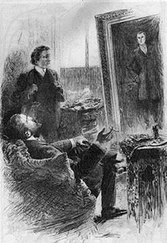During rainy days along in April, to pass the time away, I would visit them, and while sitting by the camp fire was told of what I have written above, but where they interested me most was when they discussed astronomy and meteorology. They could give the most complete description of the zodiacal heavens and the different constellations. It seems that astronomy had interested their ancestors before leaving Germany nearly one hundred and thirty years before, and it had been taught to each succeeding generation. They seemed to know the position of each planet, and on several occasions when the nights were clear, with a powerful telescope, they would try to show them to me, but as I knew little or nothing of astronomy, I understood but little of their discussions concerning the heliocentric longitude of all the planets, or the points at which they would appear if seen from the sun.
Before many months rolled around I had good reason to believe at least a part of what they tried to explain to me, and that was, that according to the planets we were nearing a certain Jupiter disturbance.
"And what does that mean?" I asked.
"That means," they explained, "It will be dry."
"Jupiter" said John, as he leisurely rolled a cigarette, "circumnavigates the sun once while the earth goes around it twelve times. In Russia Jupiter's position got between the sun and the constellation Pisces, Aries, Taurus and Gemini, it was invariably wet and cool and small grain crops were good, but as it passed on and got between the sun and the constellations Libra and Scorpio it was always followed by a minimum of rainfall and a maximum heat, which caused a severe drouth."
They had hoped it would be different in America, but explained further that when they had lived in Russia it commenced to get dry around St. Petersburg, Warsaw and all northern Russia a year or so before it did in southern Russia.
They had relatives living around Menno, in Hutchinson County, South Dakota, who had witnessed the disastrous drouth during Cleveland's administration. Jupiter was nearing the position it had then occupied and would, in sixty days, be at the same position it had been at that time.
While few people pay any attention to weather "dopsters," I did a little thinking and remembered it had been dry in southern Illinois at that time, and I began to feel somewhat uneasy. According to their knowledge, if the same in southern America as it had been in southern Russia, it would begin to get dry about a year before the worst drouth, then a very dry year, the third year would begin to improve, and after the fourth year conditions would again become normal, but the concensus of their opinion was there would be a drouth.
Table of Contents
A cloudy and threatening day in May, there came an inch of rainfall. I had completed sowing two hundred and fifty acres of flax a few days before, and soon everything looked beautiful and green. I felt extremely hopeful
During the six years I had been farming in Dakota, I had raised from fair to good crops every year. The seasons had been favorable, and if a good crop had not been raised, it was not the fault of the soil or from lack of rainfall. The previous year had not been as wet as others, but I had raised a fair crop, and at this time had four hundred and ten acres in crop and one hundred and ten acres rented out, from which I was to receive one third of the crop. I had come west with hopes of bettering my financial condition and had succeeded fairly well.
Around me at this time others had grown prosperous, land had advanced until some land adjoining Megory had brought one hundred dollars per acre, and land a few miles from town sold for fifty to eighty dollars per acre.
Before settling in the west I had read in real estate advertisements all about the wheat land that could be bought from ten to twenty-five dollars per acre, that would raise from twenty-five to forty bushels of wheat to the acre. While all this was quite possible I had never raised over twenty-five bushels per acre, and mostly harvested from ten to twenty. I had wondered, before I left Chicago, how, at a yield of thirty bushels per acre (and for the last seven or eight years prices had ranged from seventy cents to one dollar per bushel for wheat) the farmers could spend all the money. Of course, I had learned, in six years, that twenty-five to forty or fifty bushels per acre, while possible, was far from probable, and considerably above the average.
The average yield for all wheat raised in the United States is about fourteen bushels per acre, but crops had averaged from fair to good all over the northwest for some fifteen or sixteen years, with some exceptions, and the question I had heard asked years before, "Will the drouth come again," was about forgotten.
During the three years previous to this time, poor people from the east, and around Megory and Calias as well, who were not able to pay the prices demanded for relinquishments and deeded lands in Megory, Tipp county, or the eastern states, had flocked by thousands to the western part of the state and taken free homesteads. At the beginning of this, my seventh season in Dakota, the agricultural report showed an exceedingly large number of acres had been seeded, and the same report which was issued June eighth, reported the condition of all growing crops to be up to the ten-year average and some above.
It was on Sunday. I had quit breaking prairie on account of the ground being too dry, and while going along the road, I noticed a field of spelt that looked peculiar. Going into the field, I dug my fingers into the soil, and found it dry. I could not understand how it had dried out so quickly; but thinking it would rain again in a few days, it had been but ten days since the rain, I thought no more about it. The following week, although it clouded up and appeared very threatening, the clouds passed and no rain fell. On Saturday I drove into Ritten, and on the way again noticed the peculiar appearance of the growing plants. It was the topic of discussion in the town, but no one seemed willing to admit that it was from the lack of moisture. The weather had been very hot all week and the wind seemed to blow continually from the south.
In past years, after about two days of south winds, we were almost sure to have rain. The fact that the wind had blown from the south for nearly two weeks and no rain had fallen caused everybody to be anxious. That night was cloudy, the thunder and lightning lasted for nearly two hours, but when I went to the door, I could see the stars, and the next day the heat was most intense.
The Wesinbergers had said the heavens would be ablaze with lightning and resound with peals of thunder but that they were only solstice storms, coming up in unusual directions, and that such storms were characteristic of a dry season. Furthermore, that heavy, abnormal rains would occur in scattered localities, at the same time, but they would be few and far apart.
June fifteenth I took my sister to Victor to make proof on her homestead, and from there drove to Megory, stopping in Calias to send my wife a telegram to the effect that I felt I was going to be sick and for her to draw a draft on the Bank of Calias, and come home. The telegram was not answered.
Next morning my sister left for Kansas, and that afternoon a heavy downpour of rain fell all over Megory county and as far west as Victor, but north of Ritten, where I had my flax crop, there was scarcely sufficient rain to lay the dust. On that day the hot winds set in and lasted for seven weeks, the wind blowing steadily from the south all the while.
I had never before, during the seven years, suffered to any extent from the heat, but during that time I could not find a cool place. The wind never ceased during the night, but sounded its mournful tune without a pause. Then came a day when the small grain in Tipp county was beyond redemption, and rattled as leaves in November. The atmosphere became stifling, and the scent of burning plants sickening.
Читать дальше












